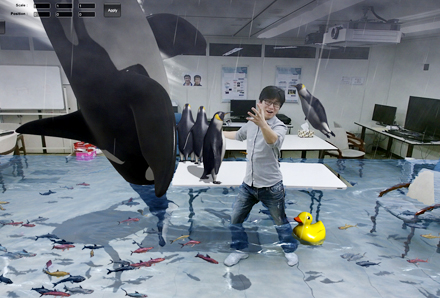
ETRI Taps into Chinese Market to Open Digital Theme Park
ETRI displayed the latest VR (Virtual Reality) experience-based content at 751 D-Park Fashion Design Plaza in Beijing, China.
On September 28th, ETRI held an opening ceremony in the Korea-China Cultural and Technological Exhibition at 751 D-Park. The festival stretched over four days from October 5th.
A total of 12 experience-based technologies were displayed, including an “interactive room” to feature technologies responsive to users’ movement; a “digital graffiti canvas system” to allow users to paint on a virtual canvas with digital sprays; and a “constellation experience” using a 360-degree cylinder display.
With the technologies displayed at the festival, ETRI secured various intellectual property rights: 58 applications for domestic and international patents and seven domestic standards of TTA(Telecommunications Technology Association), including three international standards, six SCI-level papers, and registration of three US patents.
ETRI plans to transfer its technology to Korean companies following the pilot exhibition. It anticipates to see continuous exports, when those companies begin exporting their products to China.
This festival followed the business agreement concluded in December 2014 between ETRI and 751 D-Park in Beijing to establish an organic collaborative system to ensure mutual cooperation and commercialization for digital content technology of Korea and China. ETRI had also discussed with the Ministry of Science, ICT and Future Planning to promote bilateral technology collaboration.
Following the opening of the digital experience center, ETRI is planning to open more indoor theme park experience centers in major Chinese cities, including Suzhou and Hangzhou. ETRI believes that those venues will help Korean content technology spread across China and Southeast Asia as well.
VR-based indoor theme parks are designed to display realistic digital content within a narrow space. In Korea, the Complex Welcome Center in Ulju-gun, Ulsan City and the Aerospace Museum in Jeju are preparing to open indoor theme parks in 2017, and more growth in the relevant fields is expected.
Since 2014 when it launched full cooperation with China, ETRI has transferred five technologies, earning approximately KRW 500 million. The institution is going to transfer ten additional technologies by the end of 2016, which will bring income of KRW 300 million.
ETRI provides a total of 12 types of content for display: (1)interactive room system (2)digital graffiti canvas (3)cylinder display-based constellation painting experience (4)thunderbolt punch system (5)virtual tourism experience system (6)sketch portrait studio system (7)laser-based hand-held 3D scanner system (8)4D realistic paraglider (AirGlider) (9)digital safari (10)augmented space system (11)digital aquarium and (12)3D AVAGEN.

ETRI Developed NFC-Based Networking Technology for the Internet
The ETSI (European Telecommunications Standards Institute) held an event of the 6lo (IPv6 over Networks of Resource-constrained Nodes) - 6tisch (IPv6 over the TSCH mode of IEEE 802.15.4e) plugtest in Berlin, Germany, to verify the interoperability of low-power networking technologies for the Internet. At the event, the NFC-based networking technology developed by the IETF (Internet Engineering Task Force) 6lo WG (Working Group), an international standard organization, passed the interoperability test.
Owning the original networking technology based on the NFC (Near Field Communication), a group of Korean researchers suggested related technology to the IETF in March 2015. At ETRI, Dr. Younghwan Choi and Dr. Yong-Geun Hong, director of the Intelligent IoE Network Research Section, assumed the position of editor and explained that the technology is scheduled to be set as an international standard by the end of this year.
Whereas the existing NFC technology has been widely used for access control, information collection, payment, and transportation, the technology recently developed by the researchers involves the Internet adaptation layer protocol for NFC to apply the existing technology to general Internet communications.
Currently, the NFC brings a low risk of wireless monitoring due to its low power consumption and narrow scope of radio communication within a radius of 10 centimeters on average. Despite its wide applicability for the IoT (Internet of Things), the technology has not been used for the IoT because of the absence of the Internet adaptation layer protocol technology.
The researchers believe that the new technology will prove highly beneficial in applying the existing limited payment environment to a wide range of payment environments required by O2O (Online to Offline), such as NFC-based tagging, reading, and P2P(Peer to Peer) communication functions.
At the event, ETRI participated in the IETF, an international authority to set Internet standards, and has established a total of 15 international standards in diverse Internet communications fields including IPv6, mobile technology, and IoT technology. With this achievement, the institution is continuing its endeavor for technological standardization.
